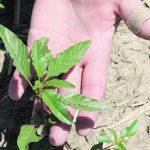Research shows burning windrows may work in Australia or Arkansas, but not in Canada due to the Prairie climate
WINNIPEG — Farmers around the globe are running out of options to control weeds. Western Australian farmers are coping with annual ryegrass, growers in Arkansas have been fighting palmer amaranth and producers in Alberta and Saskatchewan are battling kochia. It’s become clear, to some experts, that applying herbicides and more herbicides isn’t the answer. Growers […] Read moreTag Archives Weed control

Herbicide tolerant weeds cannot be ignored
Weeds resistant to herbicides are arriving on the Prairies through spring flooding, migratory geese and dirty equipment
If farmers are used to doing two glyphosate passes per year and call that “weed control,” they’ll face a shock if herbicide tolerant weeds take over their fields. Their weed control bill could jump from $20 per acre today to $150 if they have to make more passes and include multiple products. “That’s a game […] Read more
Inter-row cultivators replace herbicides

Camera-controlled cultivation consummated

The future of resistance is unfolding now
Herbicide resistance will require canola growers to use more broadly-based approaches for weed control
Controlling weeds in prairie fields is about to get a whole lot more complicated, according to a weed management specialist with Manitoba Agriculture. In a recent presentation, Kim Brown-Livingston suggested the days of depending solely on chemical herbicides to control weeds is nearing an end. “We’ve had it fairly easy in the last little while,” […] Read more
Weed control game getting hotter

Herbicide spraying window has not closed yet
Weeds can still take in chemical if they have green material, but growers must wait until they are actively growing
There is a good chance it’s too late for a fall herbicide pass on fields lying under knee-deep snow, but in areas where snow is gone or retreating, there may still be time for an effective fall treatment. Tammy Jones, provincial weed control specialist at Manitoba Agriculture, said as long as weeds have green material […] Read more
VIDEO: Goats offer another city weed control option
Using goats to control weeds is called a great option for urban parks, but those involved say there are definitely challenges
Seeing a goat chewing vigorously on a leafy spurge blossom in its mouth brings a smile to Jackie Cardinal’s face. The invasive weed is a problem in riverside parks within the City of Lethbridge, and Cardinal, the city’s parks natural resource co-ordinator, is pleased to see that goats are now among the control measures. “For […] Read more
Machine controls weeds with steam
Proponents say herbicide resistance and attacks on glyphosate make it a good time to look for alternative weed control
REGINA — Steam power is returning to prairie fields, but this time as a weed control option that may disrupt conventional broad-acre weed management. “The X-Steam-inator is 100 percent steam, there is no chemical whatsoever in it,” said Ron Gleim, founder of X-Steam-inator. “It’s all electric, there are no boilers, there are no flames, there […] Read more






